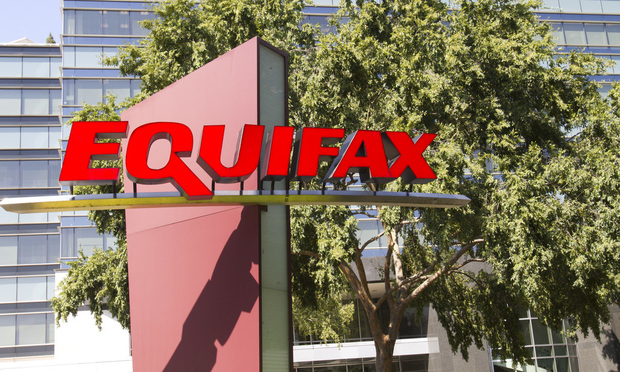Former Equifax Exec Charged With Insider Trading
The SEC accused the former executive of capitalizing on confidential company information to cash in his stock options in advance of Equifax's public announcement of a massive data breach.
March 14, 2018 at 11:35 AM
4 minute read

The former chief information officer of a division at Equifax has been charged with insider trading stemming from stock sales he made following a massive data breach, according to the U.S. Securities and Exchange Commission.
Byung J. “BJay” Pak, U.S. attorney for the Northern District of Georgia in Atlanta, has filed criminal charges against Jun Ying, who was in line to be the Atlanta-based credit bureau's next global chief information officer when the Atlanta-based company was hacked last year, the SEC announced Wednesday.
Ying, who was indicted on the criminal charges Tuesday, will be arraigned later this week before U.S. Magistrate Judge Linda T. Walker.
The SEC accuses Ying of capitalizing on confidential company information to cash in his stock options in advance of Equifax's public announcement of a massive data breach. Equifax has said the hack potentially compromised personal and financial data of an estimated 148 million consumers.
Equifax discovered the hack in July 2017 but did not notify the public until September.
The SEC complaint claims Ying exercised all of his vested stock options and sold the shares for nearly $1 million prior to public disclosure of the hack. In doing so, Ying avoided more than $117,000 in losses, the SEC said.
“Ying used confidential information to conclude that his company had suffered a massive data breach, and he dumped his stock before the news went public,” said Richard R. Best, director of the SEC's Atlanta Regional Office. ”Corporate insiders who learn inside information, including information about material cyber intrusions, cannot betray shareholders for their own financial benefit.”
Ying is represented by Schulte Roth & Zabel partners Douglas Koff and Craig Warkol. A law firm spokesperson declined to comment due to the ongoing litigation.
On Wednesday, Equifax interim Chief Executive Officer Paulino do Rego Barros Jr. issued a statement saying, “Upon learning about Mr. Ying's August sale of Equifax shares, we launched a review of his trading activity, concluded he violated our company's trading policies, separated him from the company and reported our findings to government authorities. We are fully cooperating with the DOJ and the SEC, and will continue to do so. We take corporate governance and compliance very seriously, and will not tolerate violations of our policies.”
Do Rego Barros said Ying's indictment and the SEC civil complaint are unrelated to four executives who, in November, were found by a special committee of Equifax's board of directors not to have engaged in insider trading. An independent investigation concluded that the four executives complied with company policy and were not aware of the breach at the time they sold company shares. Ying sold shares nearly a month after the trades by the four executives.
According to the SEC complaint, Ying, a 42-year-old Atlanta resident, was an Equifax employee from January 2013 until October 2017, and the CIO of Equifax's U.S. Information Solutions (USIS) business unit. Ying was was offered the job as global CIO on Sept. 15, a week after Equifax went public with the hack. As CIO of USIS, Ying was often entrusted with nonpublic information about Equifax, according to the SEC.
Two other Equifax corporate officers also have been accused in civil class action complaints filed by consumers in pending multidistrict litigation in Georgia of similarly exercising their stock options in advance of the credit bureau's public announcement of the hack. Those suits contend Equifax Chief Financial Officer John Gamble sold Equifax shares worth $946,3874; Joseph Loughran, president of Equifax's USIS, exercised options to sell stock worth $584,099; and Rodolfo Ploder, president of the company's workforce solutions, sold $250,458 worth of stock. None of them has been charged or named as defendants in SEC complaints.
According to federal prosecutors, Ying texted a co-worker on Aug. 25 that the breach they were working on “Sounds bad. We may be the one breached.” Ying conducted web searches that following monday on the impact of a 2015 data breach on Experian's stock price. Later that morning, Ying exercised all of his available stock options held at UBS Financial Services, resulting in his receiving 6,815 shares of Equifax stock, which he then sold.
He received more than $950,000 and realized a gain of over $480,000.
This content has been archived. It is available through our partners, LexisNexis® and Bloomberg Law.
To view this content, please continue to their sites.
Not a Lexis Subscriber?
Subscribe Now
Not a Bloomberg Law Subscriber?
Subscribe Now
NOT FOR REPRINT
© 2025 ALM Global, LLC, All Rights Reserved. Request academic re-use from www.copyright.com. All other uses, submit a request to [email protected]. For more information visit Asset & Logo Licensing.
You Might Like
View All

On The Move: Ex-Partner Returns to Lead Nelson Mullins Corporate Group, Burr & Forman Hires University GC as COO
5 minute read
Law Firm Sued for Telemarketing Calls to Customers on Do Not Call Registry

Evidence Explained: Prevailing Attorney Outlines Successful Defense in Inmate Death Case
Trending Stories
- 1We the People?
- 2New York-Based Skadden Team Joins White & Case Group in Mexico City for Citigroup Demerger
- 3No Two Wildfires Alike: Lawyers Take Different Legal Strategies in California
- 4Poop-Themed Dog Toy OK as Parody, but Still Tarnished Jack Daniel’s Brand, Court Says
- 5Meet the New President of NY's Association of Trial Court Jurists
Who Got The Work
J. Brugh Lower of Gibbons has entered an appearance for industrial equipment supplier Devco Corporation in a pending trademark infringement lawsuit. The suit, accusing the defendant of selling knock-off Graco products, was filed Dec. 18 in New Jersey District Court by Rivkin Radler on behalf of Graco Inc. and Graco Minnesota. The case, assigned to U.S. District Judge Zahid N. Quraishi, is 3:24-cv-11294, Graco Inc. et al v. Devco Corporation.
Who Got The Work
Rebecca Maller-Stein and Kent A. Yalowitz of Arnold & Porter Kaye Scholer have entered their appearances for Hanaco Venture Capital and its executives, Lior Prosor and David Frankel, in a pending securities lawsuit. The action, filed on Dec. 24 in New York Southern District Court by Zell, Aron & Co. on behalf of Goldeneye Advisors, accuses the defendants of negligently and fraudulently managing the plaintiff's $1 million investment. The case, assigned to U.S. District Judge Vernon S. Broderick, is 1:24-cv-09918, Goldeneye Advisors, LLC v. Hanaco Venture Capital, Ltd. et al.
Who Got The Work
Attorneys from A&O Shearman has stepped in as defense counsel for Toronto-Dominion Bank and other defendants in a pending securities class action. The suit, filed Dec. 11 in New York Southern District Court by Bleichmar Fonti & Auld, accuses the defendants of concealing the bank's 'pervasive' deficiencies in regards to its compliance with the Bank Secrecy Act and the quality of its anti-money laundering controls. The case, assigned to U.S. District Judge Arun Subramanian, is 1:24-cv-09445, Gonzalez v. The Toronto-Dominion Bank et al.
Who Got The Work
Crown Castle International, a Pennsylvania company providing shared communications infrastructure, has turned to Luke D. Wolf of Gordon Rees Scully Mansukhani to fend off a pending breach-of-contract lawsuit. The court action, filed Nov. 25 in Michigan Eastern District Court by Hooper Hathaway PC on behalf of The Town Residences LLC, accuses Crown Castle of failing to transfer approximately $30,000 in utility payments from T-Mobile in breach of a roof-top lease and assignment agreement. The case, assigned to U.S. District Judge Susan K. Declercq, is 2:24-cv-13131, The Town Residences LLC v. T-Mobile US, Inc. et al.
Who Got The Work
Wilfred P. Coronato and Daniel M. Schwartz of McCarter & English have stepped in as defense counsel to Electrolux Home Products Inc. in a pending product liability lawsuit. The court action, filed Nov. 26 in New York Eastern District Court by Poulos Lopiccolo PC and Nagel Rice LLP on behalf of David Stern, alleges that the defendant's refrigerators’ drawers and shelving repeatedly break and fall apart within months after purchase. The case, assigned to U.S. District Judge Joan M. Azrack, is 2:24-cv-08204, Stern v. Electrolux Home Products, Inc.
Featured Firms
Law Offices of Gary Martin Hays & Associates, P.C.
(470) 294-1674
Law Offices of Mark E. Salomone
(857) 444-6468
Smith & Hassler
(713) 739-1250






